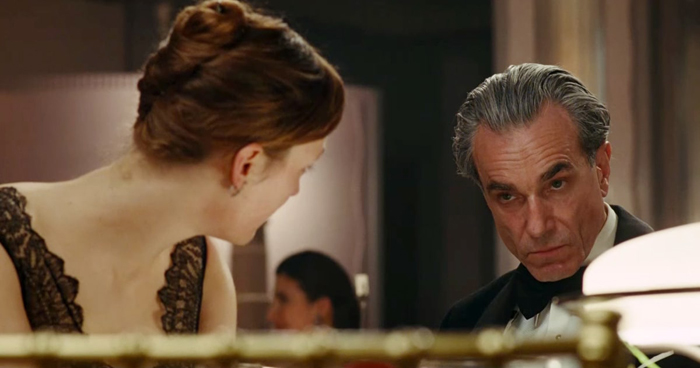Don’t be deceived by its trailers: Phantom Thread, the new Paul Thomas Anderson (Inherent Vice, Boogie Nights) film, is possibly the funniest thing he’s made yet. It’s also one of the most impeccably-crafted movies of 2017.
Daniel Day-Lewis stars as Reynolds Woodcock in what he claims will be his last role before retirement. Woodcock is an eminent fashion designer in 1950s London, a Balenciaga-like figure who appears to care more about his art than his personal life. Early in the film, we watch as Woodcock has breakfast with his domineering sister Cyril (Lesley Manville) and his girlfriend Johanna (Camilla Rutherford), whose innocent attempts at small talk are icily shut down by both siblings. It seems that Woodcock has extracted all the creativity he can from this former muse; she is now useless to him.
He later lunches at an upscale hotel restaurant, where he meets Alma (Vicky Krieps), a warm, bubbly waitress. Woodcock hilariously orders an excessive amount of food to keep her attention. They shoot looks at each other, and he asks her to dinner. After their meal, the two go to Reynolds’ country house, where Alma is asked to try on a few of Woodcock’s dresses. After Woodcock spends hours measuring every inch of Alma’s body, she tells him she “can’t stand forever.” He snaps. Anderson’s blocking (Alma always stands up straight and never looks up at Reynolds) and Krieps’ stoic delivery, however, indicate that unlike his previous girlfriend, Alma is no pushover. Woodcock’s attempt to mould her into a docile mannequin fails the first time, but he tries again throughout the film. In turn, Alma attempts to humble him, to tear down the facade of a Serious Artist he has erected.
The film is centered on Alma and Reynolds’ attempts to construct their ideal versions of one another, creating a noticeably ominous mood. The sense of dread and humour do not contradict one another. We laugh at Woodcock’s anger over Alma’s impossibly loud chewing, but also feel a sense of dread over the toxicity of the relationship. This is intensified by Anderson’s relatively sparse dialogue—the silence between lines forces the audience to think about every word uttered, building a foreboding tension that lingers over most of the film and crescendos into one of the best final acts in all of Anderson’s films.
Day-Lewis, as expected, is fantastic, but the film wouldn’t soar to the heights it does without the surly Manville and absolutely intoxicating Krieps, who utilizes every inch of her face in a manner similar to Meryl Streep.
Anderson’s direction is noticeably mature when compared to his earlier films. Magnolia (1999) follows over a dozen characters and takes place across Los Angeles, and Punch Drunk Love (2002) is a formal flex, with virtually every shot in motion. Conversely, Phantom Thread is claustrophobic and formally restrained. Anderson has become so confident in his ability to tell a compelling story that he only needs three main characters, a steady camera, and one primary location. The film has been described as a gothic romance due to the nature of its story and characters. The movie’s claustrophobia brings to mind Hitchcock’s Rebecca (1940), considered by many to be the best of all dark romance films. Underpinning the film is Johnny Greenwood’s score, an enthralling and disturbing triumph, one that adds to the film’s “quiet air of death,” but refrains from telling the audience how to feel.
Anderson has said that he first got the idea for Phantom Thread when his partner Maya Rudolph looked at him tenderly while he was ill.
“I remember seeing how much my wife was enjoying having me relatively helpless,” Anderson said in an interview with the Chicago Tribune. “Then I started thinking, wouldn’t it kind of… suit her to keep me this way?”
This is what the movie is about: The universal desire to fit and alter those closest to us, just as Woodcock would alter a dress. In the end, Woodcock does not succeed in this attempt. Alma does. She slowly chips away at his ego, and makes Woodcock desperate for her attention. Anderson, it seems, is acknowledging to Rudolph his tendency to be an asshole, and thanking her for offering levity to an ultra-serious perfectionist like himself.









